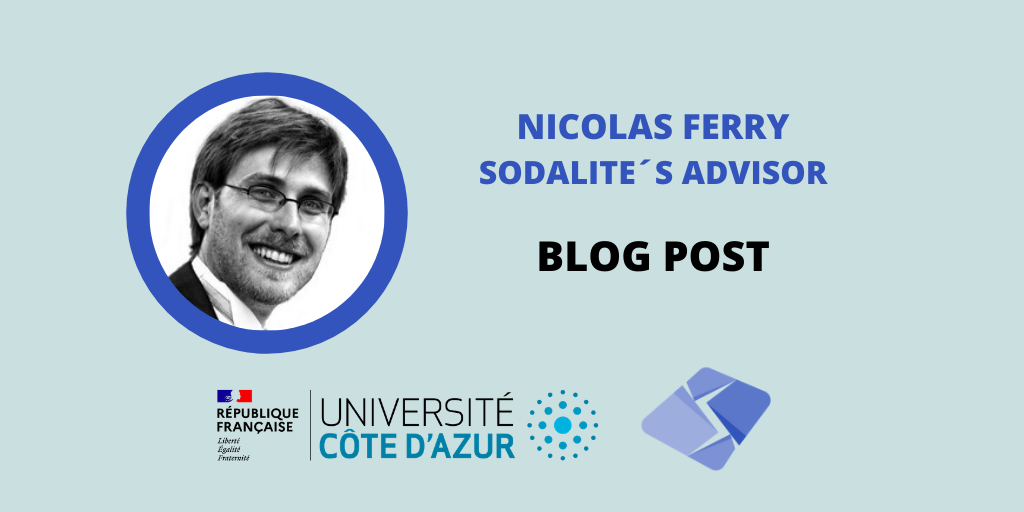Nicolas Ferry is an Associate Professor at University Côte d'Azur. Prior he was a Senior Research Scientist at SINTEF. He holds a Ph.D. degree from the University of Nice. His research interest includes model-driven engineering, domain-specific languages, Internet of Things, cloud-computing, self-adaptive systems, and dynamic adaptive systems. He has actively contributed to various national and international research projects such as the REMICS, CITI-SENSE, MC-Suite and MODAClouds EU projects, and is the technical manager of the H2020 ENACT project. He has also served as a program committee member of international conferences and workshops. At present, he is also one of the three external advisors of the SODALITE project, his view is immensily enriching for our team and we are proud to have him collaborating with us to maximize the impact of the SODALITE solutions out of the project.
His research work
For some years now, my research has revolved around different aspects related to the continuous deployment of software systems. First starting with the Continuous deployment and DevOps of multi-cloud systems, in particular, with my work around CloudML a domain specific modelling language together with an execution engine for the deployment of multi-cloud IaaS and PaaS applications. More recently, these works were extended toward supporting continuous deployment over the whole IoT, Edge and Cloud continuum with a specific focus on ensuring trustworthiness (including, security, availability, resilience and reliability) of the deployed system. These activities resulted in the GeneSIS modelling framework, which is still under development as part of the ENACT H2020 project.
- What is your opinion about the mission and vision of SODALITE? Is the ambition well aligned with reality?
- I believe the vision of SODALITE is very aligned with reality. DevOps practices are now widely adopted, still with an increasing trend, for the development and operation of Cloud-based systems. However, continuous development, deployment, and operation of systems running across HPC and cloud infrastructures are still complex activities in particular due to the high heterogeneity of these infrastructures. SODALITE has the potential to reduce this barrier by providing the necessary tools facilitating and optimizing the configuration, deployment and operation of complex systems on heterogeneous resources.
- How do you see these objectives fitting the needs of the HPC/Cloud market and the technological landscape? Are there any specific trends, in particular, that you feel SODALITE should be focusing on?
- I think these objectives are very aligned with the HPC/Cloud market and trends. Based on these objectives, I believe the SODALITE tools have the potential to fill a gap in the market between solutions for Cloud, HPC, and Edge infrastructures. I think it is important to follow DevOps trends as well as the current trend for transparent and adaptive hosting environments for a complete computing continuum.
- What is your opinion about the architecture defined and the resulting combination of HPC, Cloud and edge technologies into a holistic solution to support heterogeneous deployments?
- I think the architecture make sense and the pattern-based abstraction library is very interesting and can have some impact.
- As a project that sits at the intersection of HPC and Cloud, where do you see the largest capacity for innovation: in applying Cloud technologies to HPC, in applying HPC technologies to Cloud, or some combination of the two?
- I believe there are large business and innovation capacities in the two. That being said, I have a feeling that an “HPC as a Service” concept with proper IaC and DevOps support has the most significant innovation potential by simplifying the adoption and the use of HPC resources to non-experts. This may foster and democratize further the adoption of HPC.
- In our use cases demonstrators the main purpose is to ease the deployment phase for developers, specifically for non-experts in this domain. How important is such an innovation, and how much potential do you think such an approach could have?
- I believe facilitating deployment phase for developers, including non-experts in the domain is very important and has the potential for a major impact, fostering the adoption of DevOps practices for the development, operation and quality assurance of such complex applications. Mastering the complexity of such systems, and the large heterogeneity of their infrastructure is very challenging. Thus, offering mechanisms to specify deployment in an abstract and infrastructure independent way whilst still allowing a deployment specialized and optimized to specific infrastructure is of major importance.
- Another benefit of our use case demonstrators is the ability to facilitate legal and regulatory compliance through the dynamic reconfiguration and adaptation of both the application run-time and infrastructure levels. What could be the impact of such a solution?
- Sometimes the need to comply with regulations can hinder the development or the evolution of novel and innovative software solutions. This applies in many domains, for instance, in the eHealth domain, compliance to GDPR and ISO 27001 is a must and a proper reporting is required. Facilitating compliance as well as such reporting may definitively reduce delivery and evolution of novel solutions.
